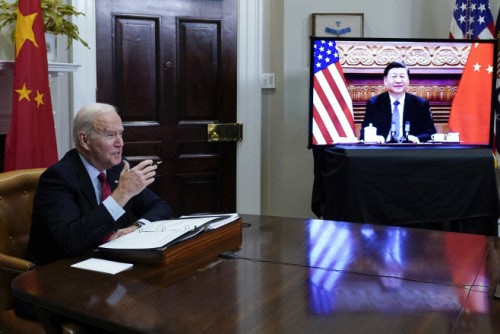 |
| The White House announced Monday that it will diplomatically boycott the Beijing Winter Olympics scheduled for February next year. This photo shows US President Joe Biden having his video summit with Chinese President Xi Jinping at the White House on November 15, 2021./ Source: Washington D.C. AP=Yonhap News |
Washington correspondent Ha Man-joo
The United States has officially decided to diplomatically boycott the Beijing Winter Olympics scheduled for February next year.
The decision is expected to affect the South Korean government’s plan to make the Beijing Winter Olympics an opportunity to resume negotiations on North Korea’s denuclearization.
“The Biden administration will not send any diplomatic or official representation to the Beijing 2022 Winter Olympics and Paralympic Games given the PRC’s ongoing genocide and crimes against humanity in Xinjiang and other human rights abuses,” White House Press Secretary Jen Psaki said Monday in a daily press briefing, referring to China by its official name, the People’s Republic of China.
The U.S. has made its diplomatic boycott decision official due to concerns about China’s repression of the Uyghurs and other Muslim minorities living in the autonomous region of Xinjiang.
“We have a fundamental commitment to promoting human rights,” Psaki said. “We feel strongly in our position, and we will continue to take actions to advance human rights in China and beyond.”
“Diplomatic boycott” means allowing athletes to participate in the Olympics, but not sending official delegations made up of officials from the government or politicians.
Earlier, U.S. President Biden had said he was considering a diplomatic boycott of the Winter Olympics in Beijing during a bilateral meeting with Canadian Prime Minister Justin Trudeau on November 18.
The decision came amid growing pressure from US politicians and human rights groups, including Democratic House of Representatives Speaker Nancy Pelosi calling for a diplomatic boycott of the Beijing Olympics.
It was also partially influenced by the disappearance of Chinese tennis star Peng Shuai, who has apparently accused former Chinese vice-premier Zhang Gaoli of sexual assault.
The Washington Post (WP) reported that China has come under fire for its response to Peng Shuai’s public accusations that she was sexually assaulted by the former vice premier who played a key role in securing the Beijing Winter Games, and Peng’s disappearance sparked concern across the sports world.
The WP reported that Peng participated in a video call with IOC officials on Nov. 21, but Olympic leaders have faced heavy criticism for their handling of the matter, which the IOC has described as a “quiet diplomacy approach.”
Britain, Canada and Australia, the major US allies who are considering diplomatic boycott of the Winter Olympics in Beijing, are highly likely to formalize it. Last month, the European Parliament adopted a resolution calling on the European Commission, the Council of the European Union, and the Member States to join diplomatic boycott.
In addition, the decision is expected to affect the South Korean government’s plan to create momentum for the resumption of denuclearization talks with North Korea, including the declaration to end the Korean War before and after the Beijing Winter Olympics.
Russian President Vladimir Putin is the only leader of a major country who has accepted an invitation.
The White House’s announcement came several hours after Chinese foreign ministry spokesperson Zhao Lijian threatened “resolute countermeasures if the U.S. insists in willfully clinging to its course.”
#US #diplomatic boycott #Beijing Winter Olympics
Copyright by Asiatoday
Most Read
-
1
-
2
-
3
-
4
-
5
-
6
-
7





















